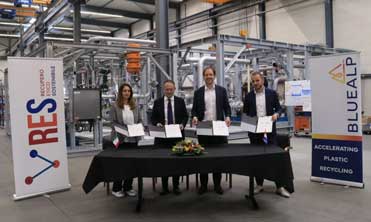Green tie-ups: Nextchem/Johnson Matthey partner in waste-to-methanol tech; BlueAlp/RES to build Italy’s first recycling plant

Italy’s Nextchem, through its MyRechemical waste-to-chemical subsidiary, will provide its proprietary circular methanol technology to Johnson Matthey for the joint commercialisation of the circular methanol package. The companies will team up to license their circular waste-to-syngas and syngas-to-methanol technologies and are already carrying out FEED study for undisclosed client in Europe.
Following the joint cooperation agreement of July 2021, aimed at integrating MyRechemical’s waste-to-syngas technology with JM’s syngas-to-methanol technology, the two companies have reached a new agreement to jointly commercialise the integrated technology under MyRechemical’s proprietary Circular Methanol trademark. MyRechemical grants JM the
right to use its proprietary Circular Methanol trademark, further enhancing the technology package’s positioning in the market.
The cooperation has recently led to the signature of the first engineering agreement for the FEED of a waste to methanol project for a confidential client in Europe. Additionally, there are various other confidential opportunities that are progressing at different levels of development across the globe.
The process uses municipal and industrial waste that cannot be mechanically recycled as the feedstock, and it chemically recycles it into synthesis gas via a partial oxidation process. The synthesis gas is then purified and conditioned, transformed into methanol and distilled to the required purity level. Circular Methanol flowsheet can also be applied to biomass conversion as well as incorporate the addition of low carbon hydrogen to maximise the carbon utilisation.
The agreement between MyRechemical and JM aims to strengthen their collaboration especially on low-carbon fuels for the shipping industry, to meet the new European shipping regulations aimed at reducing greenhouse gas emissions.
Methanol is an important intermediate product used in many goods such as resins, plastics, insulation and fibres. More importantly, it is gaining significant traction as a marine fuel, thus representing a potential enabler for transportation decarbonisation.

In other news, Dutch recycling technology company BlueAlp has signed an agreement with Recupero Etico Sostenibile S.p.A (RES), a waste management pioneer from Italy. BlueAlp will supply a technology license and will engineer, procure and fabricate the unit in its workshop in Eindhoven, the Netherlands. RES will own and operate the plant to process and convert 20 kilotonnes/year of mixed plastic waste. This plant will be set up in Pettoranello del Molise in Italy and is estimated to be operational by mid-2026.
The industrial plant, based on BlueAlp’s patented pyrolysis technology, is the first in Italy in terms of size and production capacity and will be constructed next to RES’ existing mechanical recycling facilities.
The plant will process waste that cannot be recycled mechanically, such as polyolefin film fractions. Waste plastics will be transformed back to their original form as pyrolysis oil. The oil can be used to replace raw materials in the virgin plastics value chain and chemical and petrochemical industries.
This offers a response to the large demand for high quality recycled content solutions, for example the demand from FMCG players with ambitions to make plastic food packaging circular.
BlueAlp claims its advanced recycling technology continues to be the most sustainable and economically attractive technology to convert plastic waste into cracker feedstock.
The collaboration between RES and BlueAlp emphasises that advanced recycling is beyond the phase of early adopters, and ready to tackle circularity at a global scale.
(PRA)SUBSCRIBE to Get the Latest Updates from PRA Click Here»





